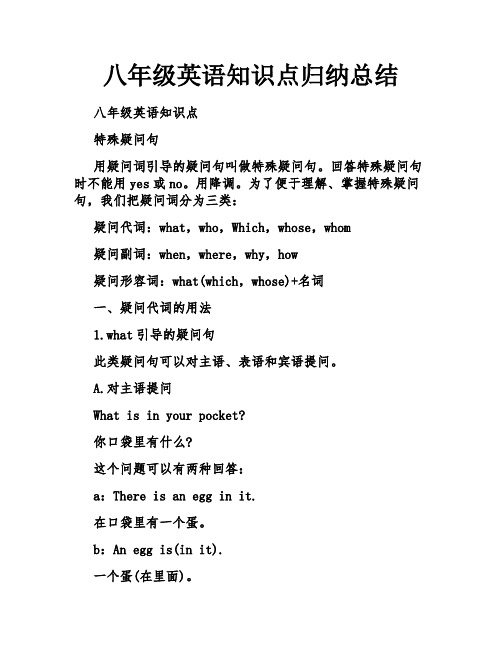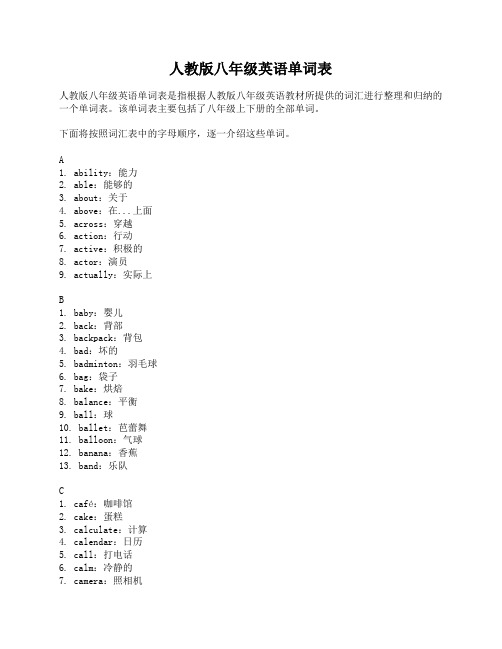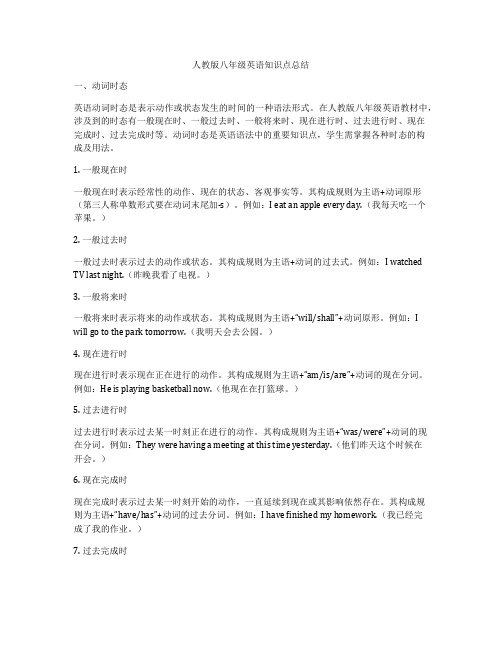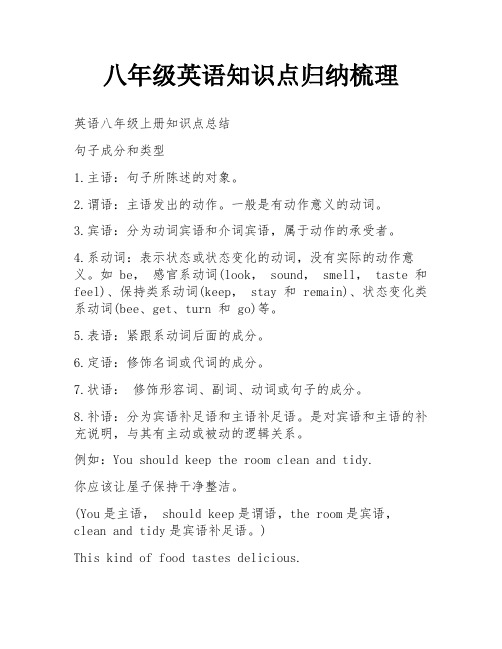八英语
八年级英语知识点归纳总结

八年级英语知识点归纳总结八年级英语知识点特殊疑问句用疑问词引导的疑问句叫做特殊疑问句。
回答特殊疑问句时不能用yes或no。
用降调。
为了便于理解、掌握特殊疑问句,我们把疑问词分为三类:疑问代词:what,who,Which,whose,whom疑问副词:when,where,why,how疑问形容词:what(which,whose)+名词一、疑问代词的用法1.what引导的疑问句此类疑问句可以对主语、表语和宾语提问。
A.对主语提问What is in your pocket?你口袋里有什么?这个问题可以有两种回答:a:There is an egg in it.在口袋里有一个蛋。
b:An egg is(in it).一个蛋(在里面)。
There are a lot of chairs in it.=A 1ot of chairs are in it.有许多椅子。
注意回答此句型的问题时,答句的单复数根据实际情况而定八年级上册英语期中知识点总结1.过去发生或完成的动作对现在造成了一定的影响和后果;2.结构:由助动词have/has+动词的过去分词构成;肯定句现在完成时的肯定句式是“have(has)+过去分词”。
注意:该句式中的have或has是助动词,has用于第三人称单数,其它人称一律用have。
疑问句现在完成时的一般疑问句式是把助动词have或has提到主语之前。
回答:Yes,…have(has).No,…haven’t(hasn’t).否定句:现在完成时的否定句式是“haven't(hasn't)+过去分词”。
3.现在完成时的时间状语:already,just,yet,since,ever,never;4.与一般过去时的区别:一般过去时是强调动作在过去发生,而现在完成时是强调过去发生的动作对现在造成了影响和后果。
5.一般过去时的时间状语:yesterday,justnow,…ago,lastweek,2yearsago,in1980等。
英语八年级所有的知识点

英语八年级所有的知识点英语作为一门国际语言,不仅在国内,而且在全球范围内具有广泛的应用。
在八年级的英语学习中,我们需要掌握各种各样的语法知识和词汇,同时,我们还需要了解一些英语文学作品和文化,以便更好地理解和运用英语。
本文将详细介绍英语八年级所有的知识点。
1. 时态和语态英语八年级的重点之一就是时态和语态的掌握。
包括简单现在时、一般过去时、现在进行时、过去进行时、现在完成时、过去完成时、一般将来时、现在将来进行时等。
此外,还需了解被动语态和进行时态的使用方法。
2. 名词和冠词名词是英语语法的基础,包括可数名词、不可数名词、集合名词等。
而冠词则分为定冠词和不定冠词,需要根据语境进行准确的运用。
3. 代词和形容词代词分为人称代词、物品代词、反身代词、相互代词等,而形容词则是描述事物或人的特征。
需要了解其性质、区分和用法。
4. 副词和介词副词包括时间副词、地点副词、程度副词等,是修饰动词、形容词、副词和整个句子的词语。
介词则是连接两个部分的关键词。
需要认识常见的副词和介词,以便正确使用。
5. 动词和形式主语动词是英语中最核心的词语,需要掌握动词的基本形式、过去式、过去分词和现在分词。
而形式主语则是将动名词作为一个名词短语使用的语法结构。
6. 并列连接词和从属连接词并列连接词用于连接两个同等重要的句子,包括and、or、but 等。
从属连接词则是用来连接从句和主句的词语,包括since、while、although等。
7. 语气语气是在交流中所使用的发音和语调,通常用于表达情感、态度和目的等。
英语的语气包括陈述语气、祈使语气、虚拟语气和感叹语气等。
8. 词根和词缀词根和词缀是英语单词的重要构成部分,可以帮助我们理解一些复杂单词的含义。
需要了解常见的词根和词缀,并且掌握其构成方法和运用。
9. 英语文学和文化英语八年级的学习中,我们还需要了解一些英语文学作品和文化。
熟悉莎士比亚、狄更斯、杰克·伦敦等文学巨匠的作品,了解英语国家的节日、习俗和风土人情,可以更好地理解和运用英语。
人教版八年级英语单词表

人教版八年级英语单词表人教版八年级英语单词表是指根据人教版八年级英语教材所提供的词汇进行整理和归纳的一个单词表。
该单词表主要包括了八年级上下册的全部单词。
下面将按照词汇表中的字母顺序,逐一介绍这些单词。
A1. ability:能力2. able:能够的3. about:关于4. above:在...上面5. across:穿越6. action:行动7. active:积极的8. actor:演员9. actually:实际上B1. baby:婴儿2. back:背部3. backpack:背包4. bad:坏的5. badminton:羽毛球6. bag:袋子7. bake:烘焙8. balance:平衡9. ball:球10. ballet:芭蕾舞11. balloon:气球12. banana:香蕉13. band:乐队C1. café:咖啡馆2. cake:蛋糕3. calculate:计算4. calendar:日历5. call:打电话6. calm:冷静的7. camera:照相机8. camp:野营9. can:能够10. Canada:加拿大11. candle:蜡烛12. candy:糖果13. capital:首都14. captain:队长D1. dad:爸爸2. daily:每天的3. dance:跳舞4. danger:危险5. dangerous:危险的6. dark:黑暗的7. date:日期8. daughter:女儿9. day:白天10. dead:死的11. deal:交易12. dear:亲爱的13. death:死亡14. decide:决定15. deep:深的E1. each:每个2. ear:耳朵3. early:早期的4. earn:赚钱5. earth:地球6. easy:容易的7. eat:吃8. education:教育9. effect:效果10. egg:鸡蛋11. eight:八12. eighteen:十八13. eighth:第八14. eighty:八十F1. face:脸2. fact:事实3. factory:工厂4. fail:失败5. fair:公平的6. fall:秋天7. false:错误的8. family:家庭9. famous:著名的10. fan:风扇11. fantastic:极好的12. far:远的13. farm:农场14. farmer:农民15. fast:快速的G1. game:游戏2. garden:花园3. gate:门4. gather:聚集5. gay:快乐的6. general:一般的7. generally:通常8. generation:一代人9. generous:慷慨的10. gentle:温和的11. geography:地理学12. get:获得13. giant:巨大的14. gift:礼物15. girl:女孩H1. habit:习惯2. hair:头发3. half:一半4. hall:大厅5. hand:手6. handsome:英俊的7. happen:发生8. happily:幸福地9. happy:快乐的10. hard:难的11. hardly:几乎不12. hat:帽子13. hate:讨厌14. have:有15. head:头I1. ice:冰2. ice cream:冰淇淋3. idea:主意4. identify:识别5. if:如果6. illegal:非法的7. imagination:想象力8. imagine:想象9. immediately:立即10. impact:影响11. important:重要的12. impossible:不可能的13. improve:改善14. in:在...里15. inch:英寸J1. jacket:夹克衫2. jail:监狱3. January:一月4. Japan:日本5. Japanese:日本人6. jar:罐子7. jaw:下颚8. jeans:牛仔裤9. jelly:果冻10. job:工作11. join:加入12. joke:笑话13. journey:旅行14. joy:快乐15. judge:法官K1. kangaroo:袋鼠2. keep:保持3. key:钥匙4. kick:踢5. kid:小孩6. kill: **7. kind:种类8. king:国王9. kiss:亲吻10. kitchen:厨房11. kite:风筝12. knee:膝盖13. knife:刀14. knock:敲15. know:知道L1. lady:女士2. lake:湖泊3. lamb:羔羊4. lamp:灯5. land:土地6. language:语言7. large:大的8. last:最后的9. late:晚的10. later:后来11. laugh:笑12. law:法律13. lead:领导14. leaf:叶子15. learn:学习M1. machine:机器2. Madam:夫人3. magazine:杂志5. make:制造6. male:男性的7. mall:商场8. man:男人9. manager:经理10. mandarin:普通话11. manner:方式12. many:许多13. map:地图14. March:三月15. market:市场N1. nail:指甲2. name:名字3. narrow:狭窄的4. national:国家的5. nationality:国籍6. nature:自然7. near:近的8. necessary:必要的9. neck:脖子10. need:需要11. needle:针12. negative:消极的13. neighborhood:社区14. neither:两者都不15. nephew:侄子O1. o'clock:点钟2. object:物体3. ocean:海洋4. October:十月5. odd:奇数的6. off:离开7. offer:提供8. office:办公室9. often:经常10. one:一个12. old:老的13. on:在...上面14. once:一次15. one:一个P1. pain:疼痛2. paint:涂料3. painter:画家4. pair:一对5. pancake:煎饼6. pants:裤子7. paper:纸8. parent:父母9. park:公园10. part:部分11. particular:特别的12. party:派对13. pass:通过14. passenger:乘客15. past:过去的Q1. quality:质量2. quarter:四分之一3. question:问题4. quickly:快速地5. quiet:安静的6. quite:相当7. quiz:测验8. quote:引用9. rabbit:兔子10. race:比赛11. radio:收音机12. rain:雨13. rainbow:彩虹14. raise:举起15. range:范围R1. rabbit:兔子2. race:比赛3. radio:收音机4. rain:雨5. rainbow:彩虹6. raise:举起7. range:范围8. rate:比率9. rather:相当10. reach:到达11. read:读12. ready:准备好的13. real:真实的14. realize:认识到15. really:真正地S1. sad:悲伤的2. safe:安全的3. safety:安全4. sail:航行5. salad:沙拉6. salary:工资7. sale:销售8. salt:盐9. same:相同的10. sand:沙子11. sandwich:三明治12. satisfied:满意的13. save:保存14. saw:锯子15. say:说T1. table:桌子2. tail:尾巴3. take:拿4. tale:故事5. talk:谈话6. tall:高的7. tape:胶带8. taste:味道9. tax:税10. taxi:出租车11. tea:茶12. teach:教13. team:团队14. tear:眼泪15. technical:技术的U1. umbrella:雨伞2. uncle:叔叔3. under:在...下面4. understand:理解5. unfortunately:不幸地6. uniform:制服7. unit:单位8. university:大学9. unless:除非10. until:直到11. up:向上12. upon:在...上13. used to:过去常常14. useful:有用的15. usually:通常V1. vacation:假期2. valley:山谷3. valuable:有价值的4. value:价值5. vegetable:蔬菜6. vegetarian:素食者7. village:村庄8. visit:参观9. visitor:参观者10. voice:声音11. volleyball:排球12. volunteer:志愿者13. vote:投票14. valuable:有价值的15. voyage:航行W1. waiter:侍者2. wake:醒来3. walk:步行4. wall:墙5. want:想要6. warm:温暖的7. wash:洗8. waste:浪费9. watch:手表10. water:水11. wave:波浪12. way:方法13. we:我们14. weather:天气15. week:周X1. X-ray:X射线2. Xbox:微软游戏机3. xerox:复印4. xylophone:木琴5. xylene:二甲苯Y1. yacht:游艇2. yawn:打哈欠3. year:年4. yellow:黄色5. yes:是的6. yield:产量7. you:你8. young:年轻的9. your:你的10. yourself:你自己Z1. zebra:斑马2. zero:零3. zip:拉链4. zone:区域5. zoo:动物园以上就是人教版八年级英语单词表的详细介绍了。
人教版八年级英语知识点总结

人教版八年级英语知识点总结一、动词时态英语动词时态是表示动作或状态发生的时间的一种语法形式。
在人教版八年级英语教材中,涉及到的时态有一般现在时、一般过去时、一般将来时、现在进行时、过去进行时、现在完成时、过去完成时等。
动词时态是英语语法中的重要知识点,学生需掌握各种时态的构成及用法。
1. 一般现在时一般现在时表示经常性的动作、现在的状态、客观事实等。
其构成规则为主语+动词原形(第三人称单数形式要在动词末尾加-s)。
例如:I eat an apple every day.(我每天吃一个苹果。
)2. 一般过去时一般过去时表示过去的动作或状态。
其构成规则为主语+动词的过去式。
例如:I watched TV last night.(昨晚我看了电视。
)3. 一般将来时一般将来时表示将来的动作或状态。
其构成规则为主语+“will/shall”+动词原形。
例如:I will go to the park tomorrow.(我明天会去公园。
)4. 现在进行时现在进行时表示现在正在进行的动作。
其构成规则为主语+“am/is/are”+动词的现在分词。
例如:He is playing basketball now.(他现在在打篮球。
)5. 过去进行时过去进行时表示过去某一时刻正在进行的动作。
其构成规则为主语+“was/were”+动词的现在分词。
例如:They were having a meeting at this time yesterday.(他们昨天这个时候在开会。
)6. 现在完成时现在完成时表示过去某一时刻开始的动作,一直延续到现在或其影响依然存在。
其构成规则为主语+“have/has”+动词的过去分词。
例如:I have finished my homework.(我已经完成了我的作业。
)7. 过去完成时过去完成时表示过去某一时刻之前已经发生的动作。
其构成规则为主语+“had”+动词的过去分词。
例如:She had gone to the park before I arrived.(我到达之前她已经去公园了。
八年级英语知识点归纳梳理

八年级英语知识点归纳梳理英语八年级上册知识点总结句子成分和类型1.主语:句子所陈述的对象。
2.谓语:主语发出的动作。
一般是有动作意义的动词。
3.宾语:分为动词宾语和介词宾语,属于动作的承受者。
4.系动词:表示状态或状态变化的动词,没有实际的动作意义。
如 be,感官系动词(look, sound, smell, taste 和feel)、保持类系动词(keep, stay 和 remain)、状态变化类系动词(bee、get、turn 和 go)等。
5.表语:紧跟系动词后面的成分。
6.定语:修饰名词或代词的成分。
7.状语:修饰形容词、副词、动词或句子的成分。
8.补语:分为宾语补足语和主语补足语。
是对宾语和主语的补充说明,与其有主动或被动的逻辑关系。
例如:You should keep the room clean and tidy.你应该让屋子保持干净整洁。
(You是主语, should keep是谓语,the room是宾语,clean and tidy是宾语补足语。
)This kind of food tastes delicious.这种食物吃起来很可口。
(This kind of food是主语, tastes是系动词, delicious 是表语。
)注意:主语、谓语、宾语、系动词、表语、补语是一个句子的主干成分;定语和状语是一个句子的修饰性成分,不是主干成分。
9.简单句的基本形式是由一个主语加一个谓语构成。
10.复合句由一个主句和一个或一个以上的从句构成。
11.两个或两个以上的简单句用并列连词连在一起构成的句子,叫做并列句,其基本结构是“简单句+并列连词+简单句”。
八年级上册英语期中知识点总结1. It takes sb. some time to do sth. 花费某人某些时间去做某事,例如:It takes me twenty minutes to get to school on foot every morning.每天早晨我步行到学校要花费二十分钟。
新人教版八年级英语单词表全册

percent (=per n.百分之… cent) twice Internet program (=programme) full swing swing dance maybe least at least junk junk food coffee health result once online television although through mind body such such as adv.两次;两倍 n.(国际)互联网;因特网 n.节目 adj.忙的;满的;充满的 n.摆动;秋千 v.(使)摆动; 摇摆 摇摆舞 adv.大概;或许;可能 adv.最小;最少;adj.&pron. 最小的;最少的 至少;不少于;起码 n.无用的东西;无价值的东西 垃圾食品 n.咖啡 n.健康;人的身体(或精神)状 n.结果;后果 adv.一次;曾经 adj.&adv.在线(的);联网 n.电视节目;电视机 conj.虽然;尽管;即使 prep.以;凭借;穿过 n.头脑;心智 n.身体 adj.&pron.这样的;那样的; 类似的 例如;像…这样
screen comfortable seat theater (=theatre) close ticket worst cheaply song DJ choose carefully reporter so far fresh comfortably service
八年级
n.银幕;屏幕 adj.使人舒服的;舒适的 n.座位;坐处(如椅子等) n.戏院;剧场 adj.(在空间、时间上)接近 n.票;入场券 adj.&adv.(bad和badly的最 高级)最差(的);最坏(的);最 糟(的) adv.便宜的;低廉的 n.歌;歌曲 音乐节目主持人 v. (chose /tʃəʊz/)选择;挑 adv.细致地;小心地;谨慎地 n.记者 到目前为止;迄今为止 adj.新鲜的;清新的 adv.舒服地;舒适地 n.接待;服务
《八年级英语》课件
PPT courseware for 8th grade English•Course Introduction •Vocabulary learning•Grammar learning •reading comprehension •Writing training •Listening training •Oral training目录CONTENTS01 Course Introduction010204 Course objectivesImprove students' reading and comprehension skills Enhance students'writing and grammarabilitiesDevelop students'speaking andlistening proficiencyIncrease students'vocabulary andlanguage knowledge03Unit 1Understanding plot and charactersReading comprehensionAnalyze the plot and characters of a storyWriting practiceWrite a short story with a clear plot and well-developed charactersUnit 2Understanding sentence structureand varietyGrammar analysisIdentify and analyze differentsentence structuresWriting practiceWrite sentences with variety in structure and style03Speaking and listening practiceUse the new vocabulary in speaking and listening activities01Unit 3Understanding the use of language02Vocabulary developmentLearn and understand new vocabulary words1 2 3 Understanding the use of language in contextUnit 4Analyze how language is used in different contextsReading comprehensionWrite a paragraph in which language usage reflects contextWriting practiceTeaching method02 Vocabulary learningBasic vocabularywords that are common and essential for daily communication, such as "hello","goodbye", "happy".Academic vocabularywords that are specific to certain fields of study, such as "photosynthesis" inbiology or "hypothesis" in math.Context-specific vocabularywords that are used in specific cultural or historical contexts, such as "chivalry" or"feudalism".Vocabulary classification通过联想将生词与已知词汇关联起来,例如,通过想象一个场景来记忆新词汇。
八年级英语语法汇总
八年级英语语法汇总英语语法学习是初中英语非常注重的重要知识点,下面是小编给大家带来的八年级英语语法汇总,希望能够帮助到大家!八年级英语语法汇总一. 形容词/副词的比较级和最高级1. 形容词/副词的比较级和最高级的构成规则(1)单音节词和少数以-er,-ow结尾的双音节单词,比较级在后面加-er,最高级在后面加-est。
① 单音节单词small→smaller→smallestshort→shorter→shortesttall→taller→tallestgreat→greater→greatest② 少数以-er,-ow结尾的双音节单词clever→cleverer→cleverestnarrow→narrower→narrowest(2)以不发音e结尾的单音节单词,比较级在原形后加-r,最高级在原级后加-st。
large→larger→largestnice→nicer→nicestable→abler→ablest(3)以一个辅音字母结尾的闭音节(即:辅音+元音+辅音)单词中,先双写末尾的辅音字母,比较级加-er,最高级加-est。
big→bigger→biggesthot→hotter→hottestfat→fatter→fattest(4)以“辅音字母+y”结尾的双音节词,把y改为i,比较级加-er,最高级加-est。
easy→easier→easiestheavy→heavier→heaviestbusy→busier→busiesthappy→happier→happiest(5)其他双音节词和多音节词,比较级在前面加more,最高级在前面加most。
beautiful→more beautiful→most beautifuldifferent→more different→most differenteasily→more easily→most easily(6)有少数形容词、副词的比较级和最高级是不规则的,必须熟记。
8年级英语几种说法
8年级英语几种说法
在英语教育中,8年级通常指的是初中阶段的第八年级,学生一般在13到14岁之间。
关于8年级的表达方式,可以有几种说法,具体表达可能因地区和教育系统的不同而有所差异:
1. Eighth Grade:这是最常见的表达方式,直接翻译为“第八年级”。
2. Grade 8:与"Eighth Grade"类似,表示第八年级。
3. Year 8:有些国家或地区使用"Year"来表示学年,因此可以说"Year 8"。
4. Form 2:在一些英联邦国家,特别是英国,学年有时用“Form”表示,第八年级可能被称为“Form 2”。
5. Class 8:有些地区可能使用“Class”表示年级,因此第八年级可以称为“Class 8”。
请根据具体的地区和上下文选择适当的表达方式。
这些说法在不同地方可能有略微的差异,但通常都能被理解。
八年级英语语法大全必看
八年级英语语法大全必看在八年级英语学习中,语法是非常重要的一部分。
掌握好语法知识将有助于你更准确地表达意思,更好地理解他人的意思。
以下是八年级英语语法的一些重点内容:1. 时态:- 现在简单时态:表示经常性、习惯性或客观事实。
- 过去简单时态:表示过去的动作或状态。
- 将来时态:表示将来要发生或打算要发生的动作。
- 进行时态:表示正在进行的动作。
- 完成时态:表示已经完成的动作。
2. 人称代词:- 主格代词:用作主语,如I, you, he, she, it, we, they等。
- 宾格代词:用作宾语,如me, you, him, her, it, us, them等。
3. 名词:- 可数名词:表示可以计数的名词,可以用a/an和数字修饰。
- 不可数名词:表示不可计数的名词,不能与a/an连用,也不能直接进行数量上的比较。
- 复数形式:通常在名词末尾加-s或-es,也有一些不规则变化。
4. 形容词与副词:- 形容词:用来修饰名词,通常在名词前面,有比较级和最高级的变化。
- 副词:用来修饰动词、形容词、副词等,通常在其前面或后面,有比较级和最高级的变化。
5. 介词:- 介词用来表示地点、方向、时间、原因等,如in, on, at, to, from, for等。
6. 从句:- 定语从句:用来修饰名词或代词的从句。
- 状语从句:用来修饰动词、形容词或副词的从句。
- 宾语从句:用来作及物动词或介宾动词的宾语的从句。
7. 连词:- 并列连词:用于连接并列的词、短语或句子,如and, but, or等。
- 从属连词:用于连接主句和从句,如when, because, although等。
这些只是八年级英语语法的一些重点内容,仅供参考。
还有许多其他的语法知识需要进一步学习和掌握。
建议你通过阅读相关的英语语法书籍、参加课堂讲解和练习来提高自己的语法水平。
- 1、下载文档前请自行甄别文档内容的完整性,平台不提供额外的编辑、内容补充、找答案等附加服务。
- 2、"仅部分预览"的文档,不可在线预览部分如存在完整性等问题,可反馈申请退款(可完整预览的文档不适用该条件!)。
- 3、如文档侵犯您的权益,请联系客服反馈,我们会尽快为您处理(人工客服工作时间:9:00-18:30)。
黄集九年制学校2015-2016学年度第一学期中测试八年级英语一、单项选择题(每小题1分,共20分)1、There is ______ M in word mice.A. aB. anC. theD.\ 2、English is one of my ______ subjects.A. the worstB. worstC. worseD. the worse 3、Look, there stands an old man ______ a handle in his hand. A. have B. has C. with D. to 4、How did you make him _____ your bike______ you ?A. to repair, forB. repair, forC. repairing, forD. repair, of 5、It is a beautiful building _____ a big garden and many trees. A. with B. and C. of D. to 6、He really enjoys making _______.A. new somethingB. new thingC. something newD. some new 7、You ’d ____ stop _____ the work. You look too tired.A. better, doB. better ,doingC. better not, doingD. better, to do 8、The Hongze Lake (洪泽湖) is a famous place __________ a long history. A. for B. in C. with D. has 9、The old man lives _________, but he doesn ’t feel _______.A. lonely, lonelyB. alone, aloneC. lonely, aloneD.alone, lonely 10、Do you think that ______should help _____?A. poor, richB. richer, poorerC. the rich, the poorD.riches, poors 11、There are ____ students in our class than in ______ class.A. fewer, theirB. fewer, theirsC. less, theirsD. less, their 12、I don ’t know ______ tomorrow morning.A. where to goB. go whereC. if goD. where go 13、Funny people can always make me ____ when I feel _____.A. happy, sadB. happy, sadlyC. happily, sadD. happily, sadly 14、The little girl is old enough and she can dress _______. A. hers B. herselvs C. herself D. himself 15、No one can help us. So we have to do the work ________. A. myself B. by us C. ourselves D. ourself16、His eyesight is very poor ______ playing computer games too much.校___________________ 班级_____________ 姓名_____________ 准考证号______________ ------------------------------------------------------------------------------------------------------------------------------------------------------------------------- 密 封 线 内 请 勿 答 题 ========================================================================================================A. becauseB. butC. butD. because of17、My cousin Andrew is crazy _____ DIY.A. withB. inC. aboutD. to18、Please fill the glass _____ milk.A. withinB. inC. useD. with19、After school, we still spend a lot of time ______ our homework.A. to doB. doingC. in doD.did20、Can you help me to ______ the picture _____ the wall?A. put on, upB. put on, toC. put up ,onD. put up, in二、完型填空(每小题1分,共10分)It is evening, 1 old cock(公鸡) is 2 in a tall tree. A fox comes to the tree and looks at the cock.“Hello, Mr Cock, I have some good news for you. ” says the fox.“Oh? ” says the cock. “What is it?”“All the animals 3 good friends now. Let’s 4 friends, too. Please come down and play 5 me.”“Fine!” says the cock. “I’m very glad to hear that. ” Then he looks up. “Look! There is something over there.”“ 6 are you looking at?” asks the fox.“Oh, I see some animals over there. 7 coming this way.”“Animals? ”“Yes. Oh, they’re dogs.”“What? Dogs !” asks the fox. “Well . . . well, I8 now. Goodbye.”“Wait, Mr Fox,” says the cock. “9 go. They are only dogs. And dogs are our frien ds now.”“Yes. But they10 that yet.”“I see, I see,” says the cock. He smiles and goes to sleep in the tree.( )1.A. the B. an C. a D. X( )2.A. sit B. sits C. sitting D. siting( )3.A. is B. am C. are D. be( )4.A. are B. be C. is D. am( )5.A. and B. to C. for D. with( )6.A. What B. How C. Whose D. Where( )7.A. He is B. They are C. She is D. It is( )8.A. must to go B. must go C. must going D. must to going( )9.A. No. B. Not C. Don’t D. Doesn’t( )10.A. aren’t know B. doesn’t know C. don’t know D. isn’t know三、阅读理解(每小题2分,共30分)AMany people like to travel by plane, but I don’t like it because an airport is usually far from the city. You have to get there early and wait for hours for the plane to take off and it is often late. you can’t open the window. You can’t choose the food. Planes are fast, but they still take hours to get out of the airport and into the city.I like traveling by train. I think trains are safe. Railway stations are usually in cities. When you are late for a train you can catch another one .you can walk around in the train and open the windows. You can see many interesting things on your way. I know it takes a little more time.I also like cars. You can start your journey when you want to, and you don’t need to get to a railway station or a bus stop. Also you can carry many things with you in a car. But sometimes there are too many cars on the road.回答下列问题:( )1. Why do many people like to travel by plane?A. Because it is fast.B. Because it is safe.C. Because you can walk around in the plane.( )2. Which is not the good thing about the train?A. It is safe.B. It takes a little more time.C. You can open the windows.( )3. If you want to take a lot of things with you ,what do you take to go out?A. A busB. A car.C. A train( )4. What is the bad thing about the car ?A. you needn’t go to a stationB. you can start your journey when you want to.C. There are too many cars on the road.( )5. What does the writer think of the plane ,train and car?A. He thinks it takes a lot of time to go to and get out of the airport.B. He likes to take a train because it takes a little more time.C. He likes to take a car because he has a car.BWe know mosquitoes(蚊子) very well. Mosquitoes fly everywhere. They can be found almost all over the world, and there are more than 2,500 kinds of them.No one likes the mosquito. But the mosquito may decide if she loves you. She? Yes, she. The male mosquito doesn’t bite! Only the female mosquito bites because she needs blood to lay eggs. She is always looking for things or people she wants to bite. If she likes what she finds, she bites. But if she doesn’t like your blood, she will turn to someone else for more delicious blood. Next time a mosquito bites you, just remember you are chosen. You’re different from the others!If the mosquito likes you, she lands on your body without letting you know. She bites you so quickly and quietly that you may not feel anything different. After she bites, you will have an itch(痒) on your body because she puts something from her mouth together with your blood. When the itch begins, she has flown away.And then what happens? Well, after her delicious dinner, the mosquito feels tired. She wants to find a place to have a good rest. There, in a tree or on a wall, she begins to lay eggs, hundreds of eggs.根据短文内容,判断下列句子的正误。
